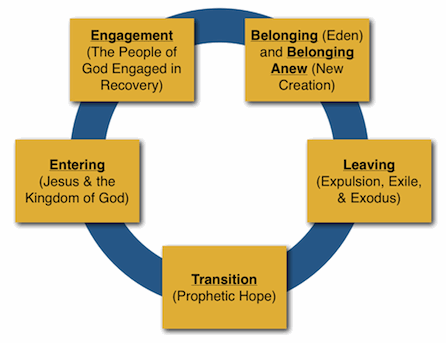Thomas Grosh IV, Emerging Scholars Network’s Associate Director, shares some reflections inspired by Romans 12:1-21, Philippians 2:1-18, and Psalm 122:1-9 which challenge us to live as God created us to live.
And this is my prayer: that your love may abound more and more in knowledge and depth of insight, so that you may be able to discern what is best and may be pure and blameless for the day of Christ, filled with the fruit of righteousness that comes through Jesus Christ – to the glory and praise of God. — Philippians 1:9-11
Many of us are comfortable with saying that we desire to love God with all our heart, soul, mind, and strength. But what happens in the gritty-ness of the daily, real world life in which God calls us to love Him, our neighbors, and the creation with our bodies, all the gifts which He’s given us, and the skills which we’ve honed in higher education? How do we choose to follow Jesus on A Long Road of Obedience in the Same Direction instead of the temptations offered to us by the flesh, the devil, and the world?
We are apprenticed by God the Father through the Word and the Spirit, in the context of the people of God, worked out in the daily grind of following Jesus on campus, and as part of larger mentoring communities such as InterVarsity Christian Fellowship’s Emerging Scholars Network. Love of God, love of neighbor, love of creation, and proper self-understanding is set in the context of the Biblical story. Some texts which have informed my thoughts are Romans 12:1-21, Philippians 2:1-18, and Psalm 122:1-9.
So how do the flesh, the devil, and the world influence our perception of reality and press us into its mold? The answer is uncomfortably easy, we follow our greatest love. Augustine comments in his Confessions: "My love is my weight: wherever I go my love is what brings me there" (13:9). Have you ever considered that what you give your greatest time and energy to may very well be your greatest love? David Naugle, professor of philosophy at Dallas Baptist University and author of Worldview: The History of A Concept, draws attention to the danger of The Socialized Mind which…
- understands and thinks what our society says it should understand and think.
- loves and values what our society says it should love and value.
- does and achieves what our society says it should do and achieve.
Wow! And what religion accompanies such a perspective in many Christian households? Christian Smith and Melinda Lundquist Denton, in their analysis of the National Survey of Youth and Religion (NSYR) entitled Soul Searching: The Religious and Spiritual Lives of American Teenagers, terms the de facto dominant religion among contemporary U.S. teenagers Moralistic Therapeutic Deism. The creed of 3,370 U.S. teenagers can’t be wrong and it doesn’t become more orthodox in most institutions of higher education!
- A God exists who created and orders the world and watches over human life on earth.
- God wants people to be good, nice, and fair to each other, as taught in the Bible and by most world religions.
- The central goal of life is to be happy and to feel good about oneself.
- God does not need to be particularly involved in one’s life except when God is needed to resolve a problem.
- Good people go to heaven when they die.
—Christian Smith with Melinda Lundquist Denton. Soul Searching: The Religious and Spiritual Lives of American Teenagers. Oxford: Oxford University Press, 2005, pp.162-163.
Paul exhorts us not to be conformed to the world, to reject its corrupted storytelling influences on our perception of reality. But how do we go beyond saying that we love God with all our heart, soul, mind, and strength, to doing such in the daily grind? How do we reproduce the likeness of Jesus as individuals and a community of scholars? How do we reject what Smith and Denton term, “a pathetic version” of Christianity, one “being colonized and displaced by a quite different faith?” (p.171)
By embracing God and receiving His embrace, by locating ourselves in and living as part of the true story, i.e., an extension of what He has to say in His Word. And what’s the story?
The Biblical Story begins with the most excellent, beautiful, and true being (i.e., God) lavishing His good gifts and phenomenal energy on fashioning a good creation only to have it subjected to frustration by the local and systemic sin of the stewards of His garden earth (i.e., Adam and Eve and their descendants). By His grace, God set into motion a miraculous and dangerous recovery mission that placed enmity between the evil one and all broken-ness … playing out through history via a series of movements from
Belonging – Leaving – Transition – Entering – Engagement – Belonging Anew

The seed had been planted, the tree of the Kingdom of God grew and in due time bore the blossom of Hope in the person of Jesus Christ. Now by the power of His death on the cross and triumph over death, we as Spirit-filled people of God live in the first fruits of a world turned right side up by Jesus. And we long for the day our love of God, love of neighbor, love of creation, and proper self-understanding will be restored in their fullness. At that time we will love God with all our heart, soul, mind, and strength, love our neighbor as our self, and care for the garden as we were originally intended. Today, we are in the midst of the recovery mission.
Conclusion
We live in exile, eagerly anticipating the day of redemption. Let us be bold, shameless followers of Christ, not the systems of this world. Let us extend the Gospel and its ramifications in word, life, and research. But let us not forget to search the Scriptures and speak with zeal according to knowledge (Acts 17:11, Romans 10:2) for we live in a time of great resources and as a result great responsibility (Luke 10:23-29, I Peter 3:15). This is not for applause, but to know, worship, and glorify God … drawing others to Him, not to ourselves (I Corinthians 8:1). If you lack wisdom ask God (James 1:5), draw on the community of faith. As you fall short, err, and sin, go before God in prayer, seek reconciliation/restitution with those whom you have wronged, and extend forgiveness to those who have wronged you (Matthew 15:15-35, I John 1:8-10). May God be gracious to us as we take part in tending the garden with joy as we offer everything we are, everything we do, and everything we have to God first and foremost.
Postscript (11/26/2012)
I wrote the above material in a passionate moment (original post 10/05/2009). At the time, I was sharing the above material across the spectrum of high schoolers to parents, students (undergrads and grads) to postdocs and faculty, and honestly to all who would listen among family, friends, members of our local congregation, and support team members.
I dig into these thoughts more deeply on the Emerging Scholars Network blog in series such as those based upon . . .
AND more recently in my interactions with James W. Sire, retired Senior Editor for InterVarsity Press and author of numerous books for InterVarsity Press (including The Universe Next Door). Note: Sire has become a regular contributor to the Emerging Scholars Network Blog. Although more is coming, maybe at present we should rest in the Instruction by St. Columbian, passed along by a friend in response to my original post:
How blessed, how fortunate, are those servants whom the Lord will find watchful when he comes. Blessed is the time of waiting when we stay awake for the Lord, the Creator of the universe, who fills all things and transcends all things.
How I wish he would awaken me, his humble servant, from the sleep of slothfulness, even though I am of little worth. How I wish he would enkindle me with that fire of divine love. The flames of his love burn beyond the stars; the longing for his overwhelming delights and the divine fire ever burn within me!
How I wish I might deserve to have my lantern always burning at night in the temple of my Lord, to give light to all who enter the house of my God. Give me, I pray you, Lord, in the name of Jesus Christ, your Son and my God, that love that does not fail so that my lantern, burning within me and giving light to others, may be always lighted and never extinguished.
Jesus, our most loving Savior, be pleased to light our lanterns, so that they might burn for ever in your temple, receiving eternal light from you, the eternal light, to lighten our darkness and to ward off from us the darkness of the world.
Give your light to my lantern, I beg you, my Jesus, so that by its light I may see that holy of holies which receives you as the eternal priest entering among the columns of your great temple. May I ever see you only, look on you, long for you; may I gaze with love on you alone, and have my lantern shining and burning always in your presence.
Loving Savior, be pleased to show yourself to us who knock, so that in knowing you we may love only you, love you alone, desire you alone, contemplate only you day and night, and always think of you. Inspire in us the depth of love that is fitting for you to receive as God. So may your love pervade our whole being, possess us completely, and fill all our senses, that we may know no other love but love for you who are everlasting. May our love be so great that the many waters of sky, land and sea cannot extinguish it in us: many waters could not extinguish love.
May this saying be fulfilled in us also. . .



